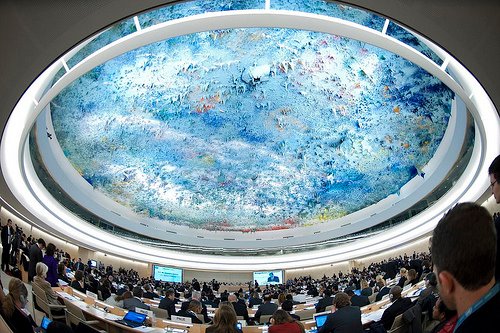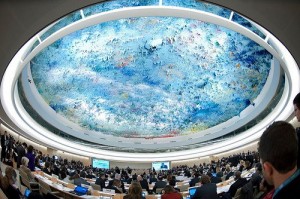On Monday, 22 June 2015, the Cairo Institute for Human Rights Studies (CIHRS) presented an oral intervention to the UN Human Rights Council (HRC) on ways to counter terrorism and ensure accountability, part of the HRC’s 29th session currently underway in Geneva and scheduled to end on July 3.
The intervention was presented in the context of the discussion of the annual report of the Special Rapporteur on the Promotion and Protection of Human Rights and Fundamental Freedoms while Countering Terrorism submitted to the current session of the HRC. The report covered an array of violations committed by non-state terrorist groups, particularly the Islamic State in Iraq and the Levant ( ISIL), in Iraq and Syria and called for immediate accountability mechanisms to combat on-going impunity for grave international law violations committed in both countries.
In this regards, CIHRS echoed the call made by the Special Rapporteur for the situation in Syria and Iraq to be referred immediately to the International Criminal Court or an ad-hoc international tribunal in order to ensure that those responsible for grave international crimes and systematic violations of human rights in both countries are prosecuted and held accountable.
CIHRS affirmed that “ensuring accountability for grave violations is necessary to counter violent extremism and terrorism,” and that “extremist thought is thriving in the shadow of decades of despotism, authoritarianism, brutal suppression, and the denial of legitimate political and economic rights.” CIHRS added, “it’s no coincidence that extremist groups have found a foothold in states like Syria and Iraq, where they grow and commit atrocities daily.”
In the intervention, CIHRS also criticized the predominant focus on tactical security and military solutions for defeating terrorist organizations, describing them as “an abject failure,” and argued that the extremist transnational ideology of ISIL can only be thwarted by forging strategies that can meet the needs of the peoples of the region and provide them with hope and dignity. The only sustainable solution to the current situation is “establishing a comprehensive democratic governing structure, deeply rooted in the respect of citizens’ rights and aspirations, and counter terrorism policies that mainstream the human rights framework within its application, including ensuring accountability for all violations.”
CIHRS concluded that ISIL and similar groups will continue to rise and become a permanent reality “without genuine reform of the current authoritarian policies of governments in the region.”
Share this Post


